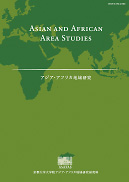It is generally believed that the idea of “development,” in the sense of economic growth induced by economic planning and usually coupled with international aid, came into public circulation only after Harry Truman announced the Point Four Program in his inaugural address as the 33
rd President of the United States. Esteva [1992] even goes so far as to say that “the era of development” dawned on January 20
th of 1949, when President Truman delivered his address.The conceptualization of the idea of “development” presupposes a certain episteme or culturo-philosophical mindset peculiar to a particular era or culture; it would be difficult to see it emerge, for example, in a religious tradition heavily steeped in the idea of karma. Drawing on the works of Rist [2010] and Okada [1992; 2001], this paper first tries to trace the origin and gradual evolvement of the concept of “development”by examining the way “history” was conceptualized in ancient Greece and Rome. The cyclical conceptualization of time borrowed from the passage of seasons and lifecycles of animals and plants eventually was followed by the birth of the ideology of progress after Europe had experienced the Scientific Revolution, Enlightenment and Industrial Revolution from the 17
th century to the late 18
th century. The unfolding of Western “humanitarian colonialism” à la “civilizing mission” in the latter half of the 19
th century is also discussed, since it presaged many policies and projects that have come to be implemented in the “era of development.” One example of “humanitarian colonialism” closely reviewed in the paper is the “Ethical Policy” implemented in the Dutch East Indies (present Indonesia) for about 30 years in the early 20
th century. Like many other policies of “humanitarian colonialism,” the Ethical Policy tried to improve the economic wellbeing, social welfare and educational level of the “natives.” The irony of the “humanitarian colonialism” is that the more educated the natives were, the more vocal their objection to colonialism had become. No matter how well-intentioned “humanitarian colonialism” might have been, there had been no undoing the colonizing and colonized relationship.This paper is the first of a two-part analysis of the evolvement of the concept of “development.” The focus of this paper is on Europe where monarchs predominated until the early 20
th century and international relations were always couched in terms of domination and subordination, especially in their relationships with areas and peoples outside of Europe. The second installment focuses on the United States of America, which espouses republicanism and democracy. It is the intention of the second installment to understand why the idea of “development” was proposed by the US, not by European powers, by looking at the diplomatic relations that the US had with Latin American countries in the 19
th and 20
th centuries.
抄録全体を表示
